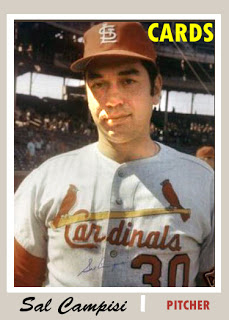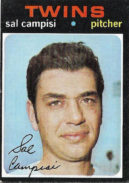
Six years ago, former MLB Commissioner Bud Selig and the MLB Alumni Association agreed to pay life annuities to former professional baseball players who were not originally eligible to receive pensions.
As of 1980, a player who spends 43 days on a Major League roster qualifies for a pension from the league, while spending just one day on an active professional roster guarantees a lifetime of health insurance coverage.
Currently, about 500 former ballplayers do not receive MLB pensions since they retired prior to 1980. However, at least for one, just getting something from the league is good enough.
Sal Campisi grew up playing CYO baseball at St. Finbar, Bath Beach, where he also sold copies of The Tablet every Sunday after Masses. He went on to pitch for Most Holy Trinity H.S., Williamsburg.
After four years at LIU’s Brooklyn campus, the talented right-hander signed with the Cardinals in 1964. He made his MLB debut in August 1969 and spent parts of three big-league seasons playing for the Cardinals and Minnesota Twins.
In 50 career relief appearances, he posted a 3-2 record with four saves, 35 strikeouts and a 2.70 ERA.
“It’s just a boyhood dream, and I accomplished it,” said Campisi, 74, of his playing days. “It was a great feeling. I always wanted to play baseball in the Major Leagues, and I got the opportunity.”
 Campisi was 30 years old when he retired from pro ball in 1972. He went to work for General Telephone in Clearwater, Fla., and worked for the company until his retirement in 1993. He currently resides in St. Petersburg Beach, Fla.
Campisi was 30 years old when he retired from pro ball in 1972. He went to work for General Telephone in Clearwater, Fla., and worked for the company until his retirement in 1993. He currently resides in St. Petersburg Beach, Fla.
Since he retired from the game before 1980, Campisi received no monetary compensation or health insurance from the league until the new agreement was adopted in 2011. A player had to have at least four years of service time at the Major League level to qualify for a pension.
Based on the new agreement, Campisi now receives $2,500 per year in annuities. His service time in the big leagues is equal to about four quarters, or one year, with each quarter worth $625. Players who retired prior to 1980 are eligible to receive up to $10,000 in annual wages.
Jackson Heights native and journalist Doug Gladstone wrote a book, entitled “A Bitter Cup of Coffee: How MLB & The Players Association Threw 874 Retirees a Curve,” profiling 40 former players who did not qualify for the pension system.
Many of those players – often referred to as baseball’s “forgotten boys” – felt they were being cheated out of money rightfully due to them. Campisi however has viewed the institution of these life annuities in a different way.
“Major League Baseball has done something for us,” said Campisi, who has received these payments for the past six years. “More or less, this is some form of token or compensation. But I guess something is better than nothing.”
Legally, the MLB did not have to do anything for this group of players. In fact, several former players filed a class-action lawsuit in 2002 demanding pensions from MLB, but the suit was dismissed.
So rather than being “forgotten,” this group of players was remembered – albeit not to the same standards of those that came after them.
“I guess they (MLB) didn’t have to legally, but out of the goodness of their hearts they’re doing something,” Campisi said. “I’m not a greedy person, and I’m thankful they did something. At least they recognized us.”
Campisi said he is not sure if he will continue receiving these payments based on the MLB’s new collective bargaining agreement. The payments were originally set to last five years, but Campisi has already received his sixth annual payment.
After years of waiting, Campisi, along with hundreds of former players who originally did not qualify for any retirement benefits, was rewarded by the league for his contributions to the national pastime.
“It was nice of them to do it,” he said. “And as long as they keep sending it, I will accept it!”
Contact Jim Mancari via email at jmmanc@gmail.com.
